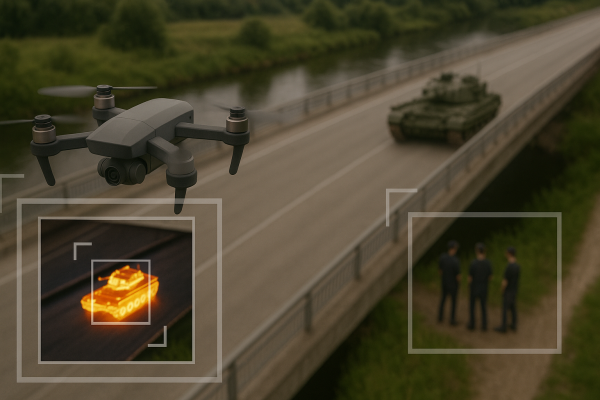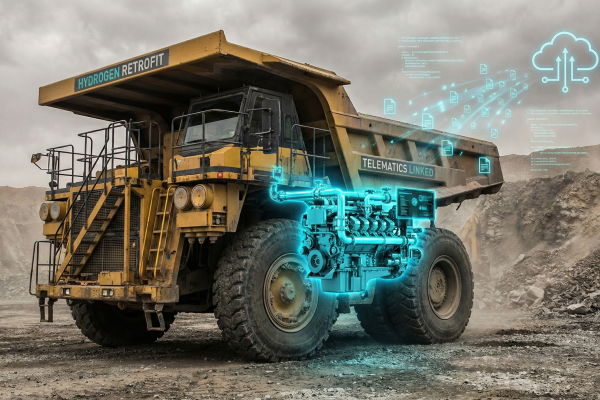January 9th, 2025 | 07:05 CET
ARI Motors, Volkswagen, BYD – E-mobility between urban niche, China strategy, and ethical boundaries
Electromobility is changing the automotive industry at all levels – from agile small vans for city centre operations to vehicles used on the factory premises of large corporations: cost-efficient solutions are in demand. The German manufacturer ARI Motors is conquering the niche of inner-city deliveries and artisan businesses with its small and nimble electric vehicles. Meanwhile, the industry's big players are fighting for market share in China. Volkswagen is expanding its strategic partnership with Chinese EV pioneer Xpeng to develop new EV models for the Asian market and roll out a nationwide network of 20,000 fast-charging stations. Chinese automaker BYD, however, is making headlines in Brazil – not for its innovations but for a scandal involving questionable working conditions during the construction of a new factory.
time to read: 4 minutes
|
Author:
Juliane Zielonka
ISIN:
ARI MOTORS INDUSTRIES SE | DE000A3D6Q45 , VOLKSWAGEN AG VZO O.N. | DE0007664039 , BYD CO. LTD H YC 1 | CNE100000296
Table of contents:

"[...] We know exactly what we are doing and are implementing what we consider to be a proven technology in an industrially applicable and scalable way. [...]" Uwe Ahrens, Director, Altech Advanced Materials AG
Author
Juliane Zielonka
Born in Bielefeld, she studied German, English and psychology. The emergence of the Internet in the early '90s led her from university to training in graphic design and marketing communications. After years of agency work in corporate branding, she switched to publishing and learned her editorial craft at Hubert Burda Media.
Tag cloud
Shares cloud
ARI Motors: EUR 4.40 per 100 km for an urban mobility revolution
Tradespeople are familiar with the problem. A new job is in the middle of the city centre, the tools are too heavy to transport by public transport, and the parking situation is unbearable or unaffordable. This is where the small and agile electric vehicles from ARI Motors come into play. Named after the Japanese term for "ant", the electric runabouts fit into even the narrowest alleys and on pedestrian paths of parks and green spaces.
The models can be charged with fresh electricity both at standard power outlets and at e-charging stations. Electricity costs are only about EUR 4.40 per 100 km at an electricity price of EUR 0.30/kWh - compared to EUR 16–18 for a conventional combustion engine. There are many possible applications. Whether tradespeople or service providers for inner-city deliveries, large companies such as Coca-Cola, Bayer or Schaeffler for trips on the factory premises or for municipal operations, for maintaining public parks and green spaces – ARI is as versatile as its range of models. There are now 50 versions, including a model for ground operations in military bases.
Last year, the Company increased its turnover to EUR 6 million, delivered 236 vehicles and even optimised the after-sales process in several languages by improving the online shopping offer. "Thanks to reliability, good service and the seriousness of our framework agreements, we were able to secure larger order quantities," emphasises CEO Thomas Kuwatsch. The strategy of a low entry-level price of EUR 2,995 is particularly beneficial for companies in times of recession. "Especially in times of crisis, many buyers appreciate the good price-performance ratio of our vehicles," explains Kuwatsch. For the coming financial year 2025, Kuwatsch expects to sell up to 500 vehicles. This risk-conscious forecast is based on the current weak economic situation in Germany, where the Company is based, and the challenging market conditions in the electric mobility sector.
Despite the cautious sales forecast, management remains confident. ARI Motors strives to continuously improve its products and expand its services. Its customers range from the Emil-Nolde-Museum near the German-Danish border down to Lake Constance. So far, its established export markets include Austria, Spain, Italy, the Czech Republic and France. In Portugal, for example, the little ant is used to cultivate olive groves. ARI Motors stands for pragmatic and customer-oriented electromobility.
Volkswagen is strengthening its collaboration with e-vehicle maker XPeng for fast-charging stations
While Volkswagen is cutting around 35,000 jobs in its home country and wants to shrink management salaries, the Company is expanding its cooperation in China with the local EV maker XPeng. Both manufacturers will open their fast-charging networks to each other's users, thus further expanding the nationwide supply of charging infrastructure. The two companies also plan to build jointly branded fast-charging stations.
The dimensions of this agreement are unprecedented: around 20,000 charging stations in 420 Chinese cities will be available to drivers of both brands in the future. Whether an XPeng or Volkswagen driver, both will benefit from the generous coverage.
As early as 2023, Volkswagen acquired a 5% stake in XPeng for around USD 700 million. In addition, two new VW electric vehicle models will be sold in the Chinese market under the XPeng brand by 2026. This Trojan horse strategy is intended to help the German automaker sell more vehicles in China.
XPeng, also known as Xiaopeng Motors, was founded in Guangzhou, China, in 2014 and has a branch in Munich. Its best-known investors include Alibaba, Foxconn and IDG Capital. In addition to electric vehicles, XPeng is also developing autonomous driving technologies, operating systems, and core components for electric vehicles.
BYD: Scandal over illegal Chinese workers in Brazil
The Chinese electric automaker BYD is making headlines in Brazil. A local labour inspectorate has discovered that the Company has brought several hundred Chinese workers with invalid visas to build a factory. But that is not all: the workers are said to be working under slave-like conditions.
The workers slept on beds without mattresses and had no cupboards for their belongings. There was one toilet for every 31 workers. Passports were confiscated, and 60% of wages were withheld. All of this does not reflect well on the Chinese automaker. A total of 500 Chinese workers are said to have been smuggled in, the majority of whom have left Brazil or are about to leave.
Meanwhile, BYD has terminated its cooperation with the contractor Jinjiang, which was allegedly responsible for the working conditions. Now that the inhumane conditions have been made public, BYD has promised to improve and comply with local labour laws for the remaining workers. For BYD, this human rights scandal is a major blow to its brand image.
ARI Motors specialises in small, agile electric transport vehicles. With a turnover of EUR 6 million and 236 vehicles delivered last year, the Germany-based company is demonstrating robust growth. Starting at EUR 2,995 per vehicle, the low-price strategy is proving particularly successful in the tight economic situation. The cautious forecast of 500 vehicles for 2025 shows that management has a realistic approach to business. The strategic partnership between Volkswagen and XPeng points to a significant step in VW's Chinese expansion strategy. There are plans for 20,000 co-branded charging stations in 420 Chinese cities. The development of joint electric vehicle models under the XPeng brand, in which the group holds a 5% stake, could help VW strengthen its position in the Chinese market. BYD has been exposed as a slave-labour operator of 163 Chinese workers and as a major trafficker of illegal visas, with a total of around 500 workers in Brazil on invalid visas. Its promise to comply with local labour laws from now on looks like a cosmetic fix. The damage to its image is unavoidable.
Conflict of interest
Pursuant to §85 of the German Securities Trading Act (WpHG), we point out that Apaton Finance GmbH as well as partners, authors or employees of Apaton Finance GmbH (hereinafter referred to as "Relevant Persons") may hold shares or other financial instruments of the aforementioned companies in the future or may bet on rising or falling prices and thus a conflict of interest may arise in the future. The Relevant Persons reserve the right to buy or sell shares or other financial instruments of the Company at any time (hereinafter each a "Transaction"). Transactions may, under certain circumstances, influence the respective price of the shares or other financial instruments of the Company.
In addition, Apaton Finance GmbH is active in the context of the preparation and publication of the reporting in paid contractual relationships.
For this reason, there is a concrete conflict of interest.
The above information on existing conflicts of interest applies to all types and forms of publication used by Apaton Finance GmbH for publications on companies.
Risk notice
Apaton Finance GmbH offers editors, agencies and companies the opportunity to publish commentaries, interviews, summaries, news and the like on news.financial. These contents are exclusively for the information of the readers and do not represent any call to action or recommendations, neither explicitly nor implicitly they are to be understood as an assurance of possible price developments. The contents do not replace individual expert investment advice and do not constitute an offer to sell the discussed share(s) or other financial instruments, nor an invitation to buy or sell such.
The content is expressly not a financial analysis, but a journalistic or advertising text. Readers or users who make investment decisions or carry out transactions on the basis of the information provided here do so entirely at their own risk. No contractual relationship is established between Apaton Finance GmbH and its readers or the users of its offers, as our information only refers to the company and not to the investment decision of the reader or user.
The acquisition of financial instruments involves high risks, which can lead to the total loss of the invested capital. The information published by Apaton Finance GmbH and its authors is based on careful research. Nevertheless, no liability is assumed for financial losses or a content-related guarantee for the topicality, correctness, appropriateness and completeness of the content provided here. Please also note our Terms of use.




